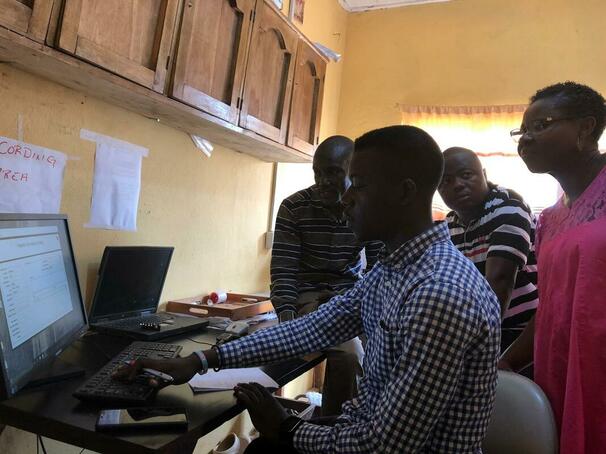 Ishmael Vandi (front), Joseph Lamin (left), Jinnah Lahai, and Cynthia Grant Ishmael Vandi (front), Joseph Lamin (left), Jinnah Lahai, and Cynthia Grant On Friday, January 18, Mercy Hospital officially launched its Electronic Medical Information System (EMIS) - a database which will enable the hospital to use electronic medical records to track patient data. The first electronic records management system in the country, the database will have a positive impact on patient care as it will be much easier to access a patient's history and chart. Hospital Administrator, Jinnah Lahai, is thrilled about this new addition to Mercy. “It has added more value to Mercy in comparison to other facilities. It will lead to greater transparency and data security." Joseph Lamin and the Mercy Laboratory team, has led the effort in creating the software that will be used. District Medical Officer, Dr. Roland Carshon-Marsh, is working closely with Mercy to supervise compliance with standards for medical records management and confidentiality. While paper will no longer be used for data entry, communication, or analysis, every electronic medical records system maintains redundant electronic and paper record back up copies - and Mercy's EMIS is no exception. Once the electronic information system is fully operational, all units of the hospital will contribute to it, enabling all patient information to be stored electronically. The EMIS also tracks drug and supply inventory and staff shift time logs. EMIS produces valid research data on diagnosis as well as effective interventions and treatments. Under the current system, patients are tracked by a patient number, but if they forget or lose that number, the staff is forced to either sort through thousands of patient cards or start a new chart. Starting a new chart is easier, but it means the loss of all patient history that preceded it. The new system will make communication between units instantaneous which will mean that patients are able to receive input on their care from a variety of Mercy staff in real time. Registration of patients will include fingerprint identification as an element to permit accurately matching patient charts with medical histories. Sierra Leone has a high rate of illiteracy and poor records in villages. Patients often do not know how to spell their names or have current address information or know their date of birth. Paper records often become damaged and unreadable or lost. Fingerprint identification mitigates against all of these challenges. Creating reports based on the data will be much easier and more accurate. The database will greatly reduce the chances of error and leave more time for analyzing data and refining programs instead of painstakingly gathering numbers. Data will also be collected from the outreach programs, which will help Mercy identify trends in who is seeking care at Mercy or its outreach, what are the most concerning diseases, and how programs can be altered to best suit the needs of the community. Lamin projects that the Mercy staff will be comfortable using the system within two weeks of its mid-January launch, and adept by week six. Mercy Dr. Sao Amara, is looking forward to the system becoming fully operational, “it will help with tracking patients, increase financial accountability, reduce patient wait times, assure patient confidentiality and and allow staff to be informed about patient status quickly.”
0 Comments
Your comment will be posted after it is approved.
Leave a Reply. |
Follow us on social media
Archive
July 2024
Click the button to read heartfelt tributes to a beloved Bishop, co- founder of our mission!
Post
|
Helping Children Worldwide is a 501 (c) 3 nonprofit organization | 703-793-9521 | [email protected]
©2017 - 2021 Helping Children Worldwide
All donations in the United States are tax-deductible in full or part. | Donor and Privacy Policy
©2017 - 2021 Helping Children Worldwide
All donations in the United States are tax-deductible in full or part. | Donor and Privacy Policy






